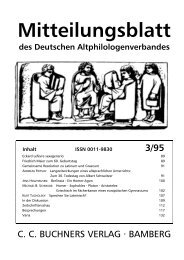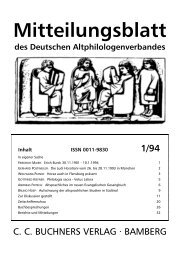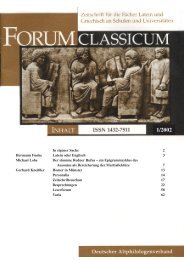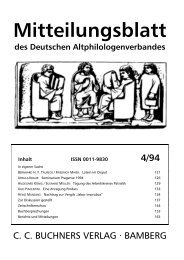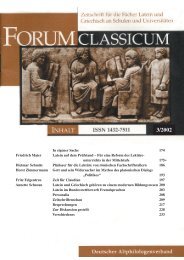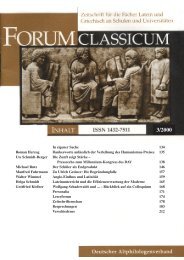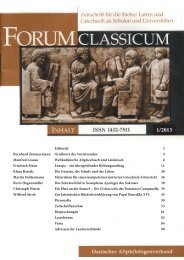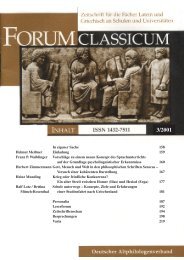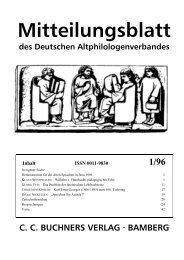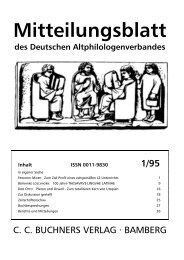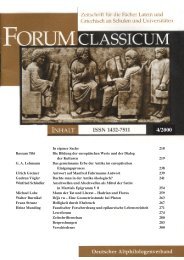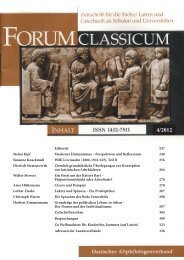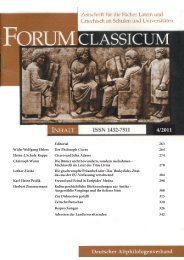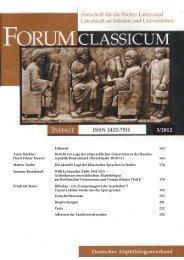2, 1997 - Deutscher Altphilologenverband
2, 1997 - Deutscher Altphilologenverband
2, 1997 - Deutscher Altphilologenverband
Sie wollen auch ein ePaper? Erhöhen Sie die Reichweite Ihrer Titel.
YUMPU macht aus Druck-PDFs automatisch weboptimierte ePaper, die Google liebt.
EUROCLASSICA hat eine Satzung, die im Handels-<br />
und Vereinsregister von Luxemburg niedergelegt<br />
und registriert ist mit Datum vom 12. und<br />
13. November 1991 (Registre de commerce et des<br />
sociétés de Luxembourg).<br />
EUROCLASSICA hält eine jährliche Mitgliederversammlung<br />
ab, die in den Kongress eines<br />
Mitgliedsverbandes eingefügt ist. Amtssprachen<br />
sind Französisch und Englisch, aber auf den Kongressen<br />
sind auch andere Sprachen zugelassen,<br />
insbesondere die Sprache des jeweiligen Gastlandes.<br />
Auf den eigentlichen Mitgliederversammlungen<br />
wird jedoch Englisch und zum Teil Französisch<br />
gesprochen.<br />
2. Ziele und Aktionen<br />
EUROCLASSICA hatte sich 1980 das folgende<br />
Aktionsprogramm gegeben, das der damalige<br />
Erste Vorsitzende, John Thorley, formuliert hat:<br />
PROGRAM OF ACTION<br />
as laid down by the committee of<br />
EUROCLASSICA<br />
1. Making EUROCLASSICA european.<br />
A. Euroclassica, which has been founded by eleven<br />
associations in Nîmes 2nd September 1991, will take<br />
steps to broaden its basis to all European countries.<br />
B. EUROCLASSICA will actively support the resurrection<br />
of the Classics in Central and Eastern Europe<br />
by furnishing materials, sending professional teacher<br />
trainers and by having colleagues from the new<br />
democracies take part in the educational conferences.<br />
C. EUROCLASSICA will take steps to have itself<br />
acknowledged as a European non-governmental<br />
organization and as such to be entitled for having its<br />
activities financially supported by European organizations<br />
such as the European Community and the<br />
Council of Europe.<br />
2. Making the Classics European.<br />
EUROCLASSICA sees it as a central task to make true<br />
the European dimension in education, which is more<br />
than just economy and communication as has been<br />
acknowledged by the ministers of education.<br />
A. Each year a conference will be organized (linked<br />
with the General Assembly) where classical teachers of<br />
the whole of Europe will meet, exchange views and<br />
teaching materials and will be instructed on teaching a<br />
specific topic.<br />
B. A European Newsletter will be produced which will<br />
appear twice a year as an appendix to the national<br />
bulletins, informing the teachers of important events (a<br />
classical calendar) and of developments in classical<br />
education (e. g. materials which can be used in various<br />
countries).<br />
C. Teachers of various countries will jointly take part in<br />
instructional tours to the main sites of the classical<br />
civilization.<br />
D. Exchanges of classical teachers will be organized<br />
for teaching and doing research in other European<br />
countries.<br />
E. EUROCLASSICA will take steps to have Latin and<br />
Greek included as subjects for the European<br />
baccalaureat.<br />
3. Making pupils and students aware of the European<br />
dimension of the Classics<br />
A. Instructional tours to sites of classical interest will<br />
bring together pupils and students who study the Classics<br />
in school, to make them aware of the common European<br />
heritage they represent.<br />
B. An annual cultural festival devoted to the Classics<br />
will be organized for youngsters. Among other cultural<br />
activities, Greek and Roman drama will be staged, in<br />
the original languages as well as in the vernacular.<br />
Preferably a Greek or Roman theatre will be the locality.<br />
C. A classical summer school, each year to be held in a<br />
different country, will bring together youngsters around<br />
a classical theme.<br />
D. Each year a central classical theme will be chosen<br />
by the General Assembly to act as a suggestion for<br />
various activities in the school all over Europe. Common<br />
publications will support the teaching of the theme. The<br />
results of the activities will be presented at the annual<br />
General Assembly / Teachers’ Conference.<br />
3. Stand der Arbeit<br />
Von diesem Aktionsprogramm ist bisher schon<br />
viel verwirklicht worden, manches hat sich als<br />
schwierig herausgestellt, manches ist zumindest<br />
inoffiziell wieder aufgegeben worden.<br />
Zu 1 (EUROCLASSICA europäisch machen):<br />
Die unter 1 genannten Ziele konnten weitgehend<br />
in den ersten Aufbaujahren erreicht werden.<br />
A. Der Aktivität des ersten Exekutivkomitees -<br />
hier sind wohl vor allem Jeannette Boulay (Frankreich)<br />
und Anton van Hooff (Niederlande) zu<br />
nennen - ist es zu verdanken, dass mittlerweile<br />
Altphilologenverbände der meisten europäischen<br />
Länder Mitglied in EUROCLASSICA<br />
sind. Man vergleiche die Liste der Mitglieder<br />
(unten Abschnitt 5).<br />
63



